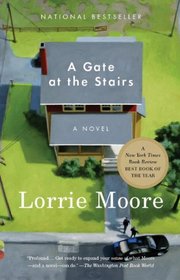Helpful Score: 10
This book is an interesting case; I don't know that I've ever come across a book that had such positive critical reception and such poor general readership reviews (here, Amazon, and library-thing). That said, I have to agree with most reader-reviewers, as I didn't enjoy this book. The flow of the book felt very disconnected and as if I was reading a series of loosely connected short stories about a common protagonist, and the writing was extremely verbose. Parts of the book set up as a dinner discussion were almost unreadable due to the poor flow and disjointed nature of the conversation. There were also things scattered throughout the story that acted as red herrings although they really seemed like plot points the author simply forgot about instead of a well-used literary device. Finally, the book had no real sense of closure and what I assumed was the main storyline stopped suddenly about 60 pages from the end and didn't have any real resolution (the main "mystery" of this storyline was also far-fetched and fairly unbelievable). Obviously critics have found something redeeming about this novel, but I didn't, and don't plan on reading anything else by Moore in the future.
Helpful Score: 10
I had a lot of high hopes for this book, especially when I first started reading it. Huge letdown, to be perfectly honest. I did not like the protagonist Tassie at all, the mystery surrounding the family's history was not believable at all, and the ending was just plain disappointing. The only redeeming qualities this book had was discussing the problems interracial families face as well as frustrations within the adoption world. Those two points were what kept me reading, but this isn't one I care to read again.
Helpful Score: 5
This book never really grabbed my attention. I kept waiting for the story to start, but it never seemed to. Can't understand why this book was awarded a Best Book of the Year Award by the New York Times. Story does not seem plausible, I was disappointed by this book.
Helpful Score: 4
This book doesn't seem to know what it's about, and as a result, I don't either. It has the disjointed style of Faulkner without the character development. There were story lines with potential but they never went anywhere. I didn't get to know any of the characters; therefore, I didn't like them or care how their stories turned out. In fact, I felt constantly reminded of the author's presence - she was always there putting words in the characters' mouths and manipulating the forward motion of the book. It seemed a bit like an expression of the author's ego rather than a story about real people.
Overall, I couldn't wait for this book to end.
Overall, I couldn't wait for this book to end.
Helpful Score: 4
This story is about a college student who takes a part-time job as nanny for a couple who have adopted a biracial toddler. The back cover says this book is about race, class, love, and war in America. But I think the author took on more than she could chew.
Lorrie Moore is an entertaining writer; this book had elements of such bright wit but also egregious misses. I kept wondering why all the main character Tassie Keltjin's mortifying mistakes were being cataloged - I honestly couldn't tell if she was hilarious or mentally challenged, or was that the book forcing the reader to be un-PC? But how does one confuse Brazilian for Middle Eastern from New Jersey? Why in the world is her toe bleeding in a tub "really a hello from death"? How could a kid in a car seat possibly reach up and repeatedly hit the driver of the car in the head with a shoe? How could an under-age, unemployed nanny afford to eat everything on the menu at Le Petit Expensive Restaurant including wine and then drive all the way home from Ohio to Wisconsin on a scooter, without a helmet in the rain?? There was so much clumsy foreshadowing, like Tassie being told she's "nobody's sister" for no reason at all.
I especially disliked the ending, being addressed by the writer or by Tassie or whatever that was.
Lorrie Moore is an entertaining writer; this book had elements of such bright wit but also egregious misses. I kept wondering why all the main character Tassie Keltjin's mortifying mistakes were being cataloged - I honestly couldn't tell if she was hilarious or mentally challenged, or was that the book forcing the reader to be un-PC? But how does one confuse Brazilian for Middle Eastern from New Jersey? Why in the world is her toe bleeding in a tub "really a hello from death"? How could a kid in a car seat possibly reach up and repeatedly hit the driver of the car in the head with a shoe? How could an under-age, unemployed nanny afford to eat everything on the menu at Le Petit Expensive Restaurant including wine and then drive all the way home from Ohio to Wisconsin on a scooter, without a helmet in the rain?? There was so much clumsy foreshadowing, like Tassie being told she's "nobody's sister" for no reason at all.
I especially disliked the ending, being addressed by the writer or by Tassie or whatever that was.





![header=[] body=[Get a free book credit right now by joining the club and listing 5 books you have and are willing to share with other members!] Help icon](/images/question.gif?v=29befa08)
